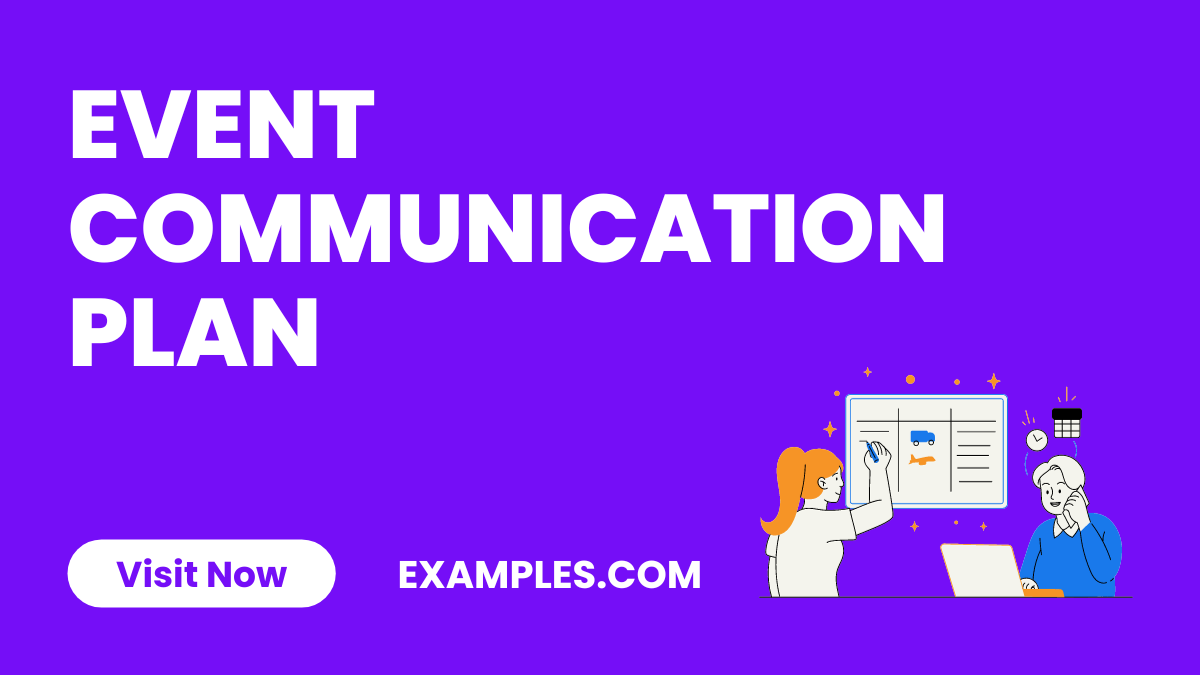6+ Event Communication Plan Examples
Embark on a journey through the realm of Event Communication Plans with our comprehensive guide. Dive into a curated selection of real-world communication examples, showcasing the essence and impact of effective dialogue in events. Discover strategies that resonate with your audience, foster stakeholder engagement, and ensure your message is heard loud and clear. This guide is your key to unlocking successful event communication, enriched with practical examples and tailored insights for a dynamic and interactive experience.
Download Event Communication Plan Bundle
Event Communication Plan
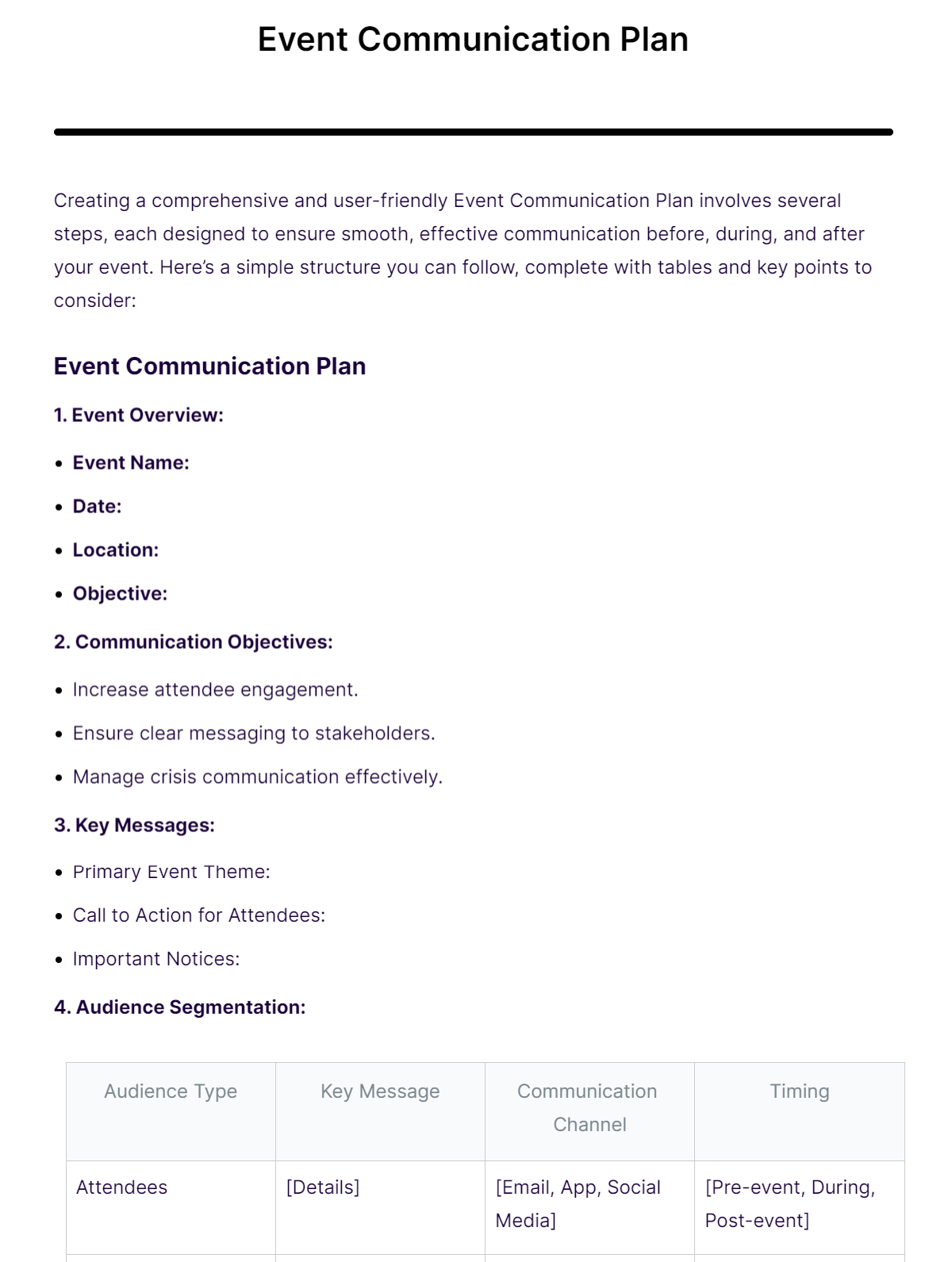
The guide on Event Communication Plan provides a detailed, user-friendly approach to creating an effective event communication plan. It outlines the essential steps required to ensure smooth and effective communication before, during, and after an event. This includes a structured approach with tables and key points to consider for each phase of the event, making it a valuable resource for event planners and organizers.
Event Management Communication Plan
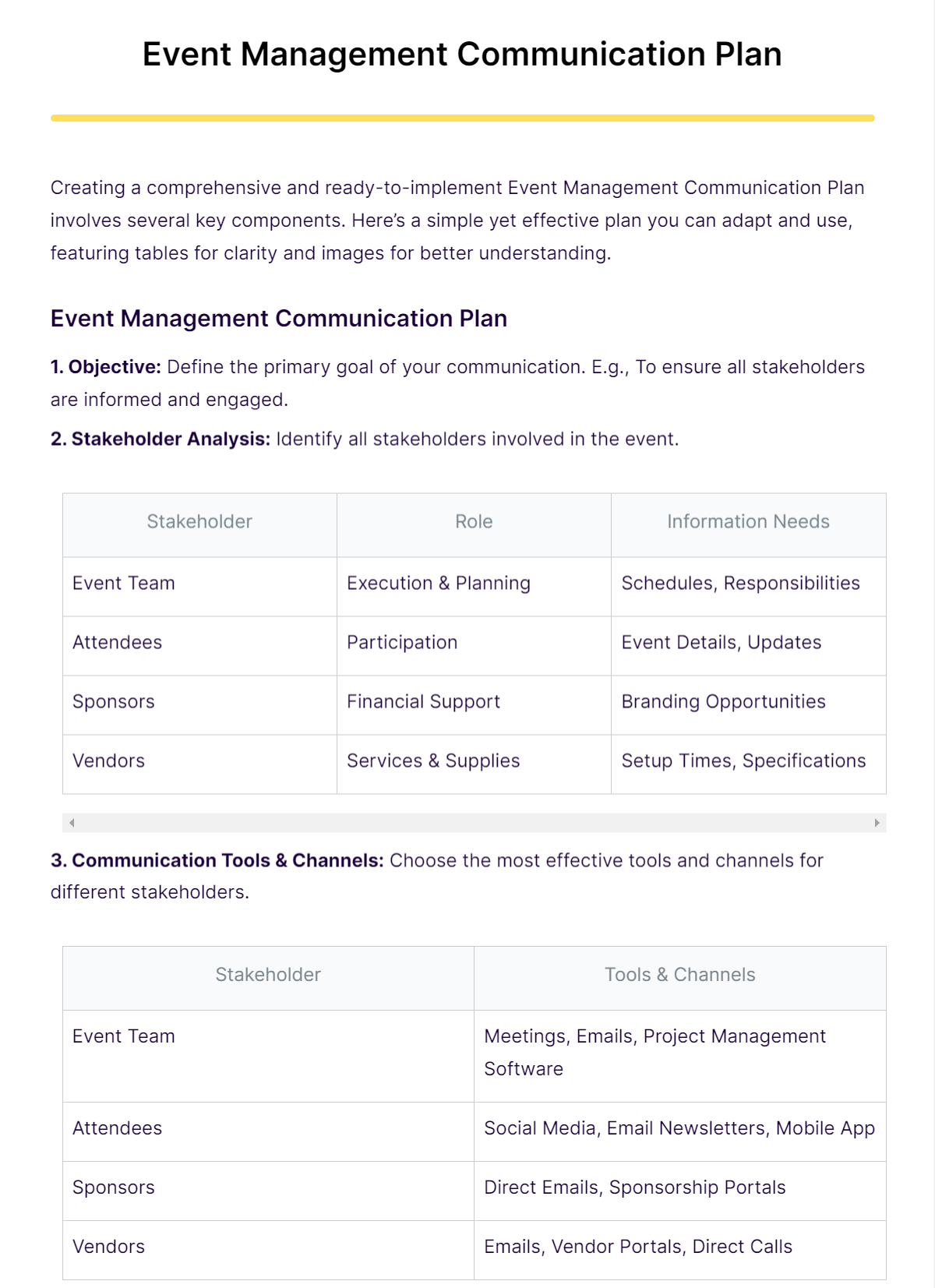
The Event Management Communication Plan offers a structured and adaptable framework for effective event communication. It emphasizes the importance of understanding stakeholder roles, selecting appropriate communication tools and channels, and developing a comprehensive strategy that includes key messages, a timeline, and roles and responsibilities. The guide also suggests visual aids like Gantt charts for timelines and stakeholder maps for clarity. By following these steps and customizing as needed, event organizers can ensure clear, engaging, and successful communication for their events.
Event Marketing Communication Plan
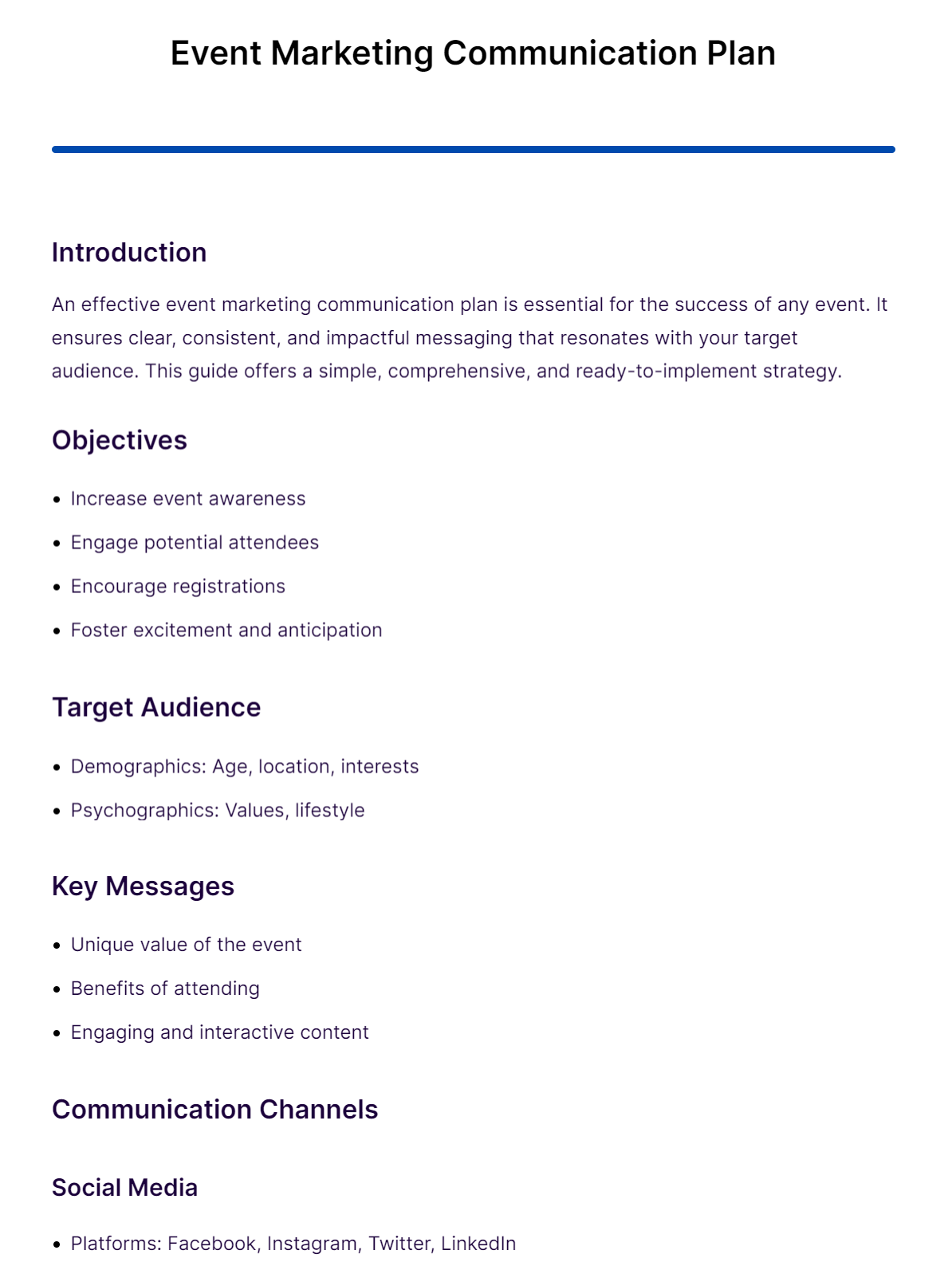
The effective event marketing communication plan. It emphasizes the importance of clear, consistent messaging tailored to a target audience’s demographics and psychographics. The plan covers various communication channels, including social media, email marketing, and press releases, and provides a timeline of activities. Budget allocation and success metrics are also discussed, ensuring a comprehensive strategy for engaging potential attendees and fostering event anticipation.
Event Crisis Communication Plan
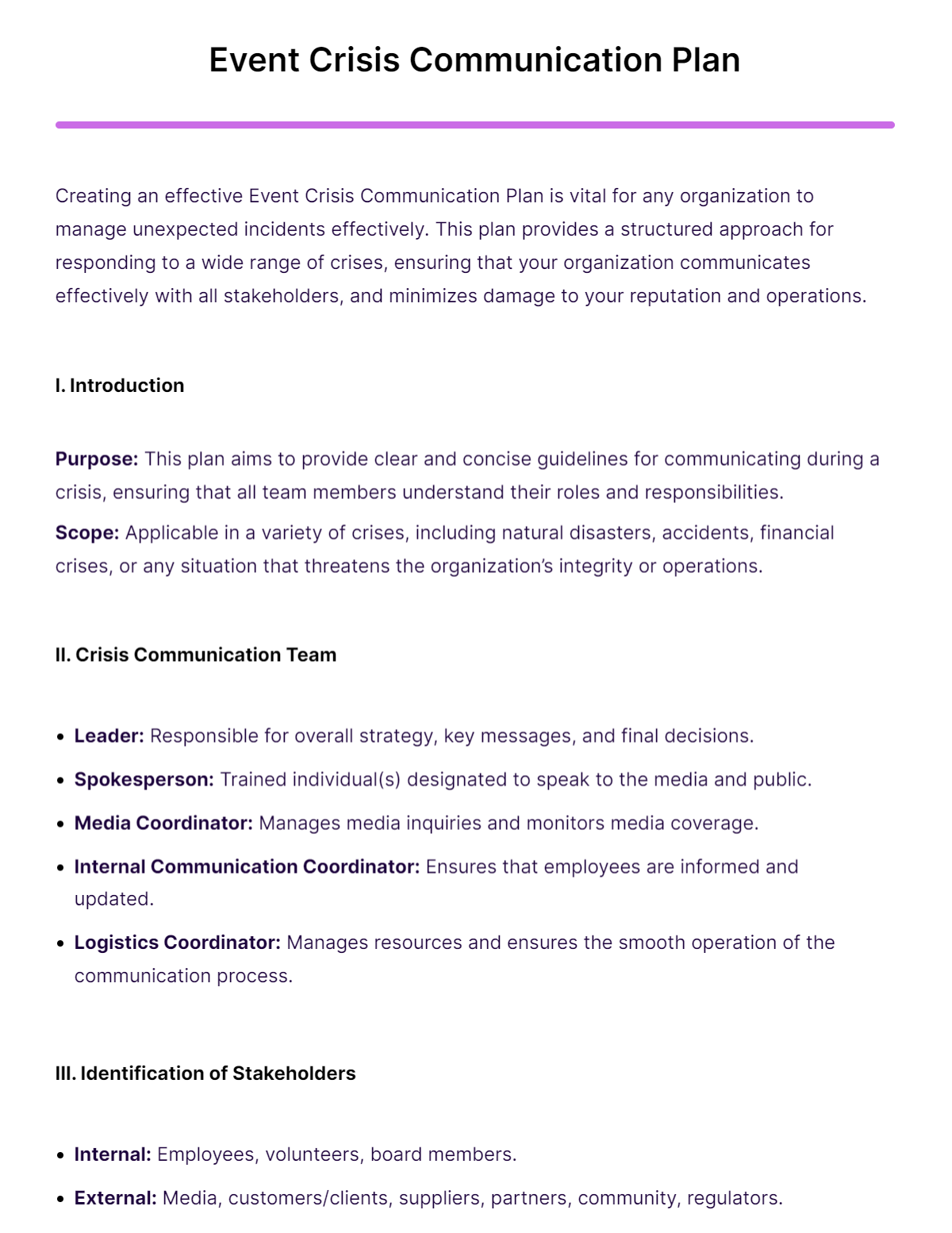
The Event Crisis Communication Plan comprehensive strategy for managing unexpected incidents effectively. It details the creation of a structured response to various crises, focusing on effective communication with stakeholders and minimizing reputational and operational damage. The plan covers roles and responsibilities, stakeholder identification, communication channels, key messages, crisis levels, action plans, monitoring, evaluation, templates, and training. This invaluable asset ensures preparedness and trust maintenance during crises
Event Training Communication Plan
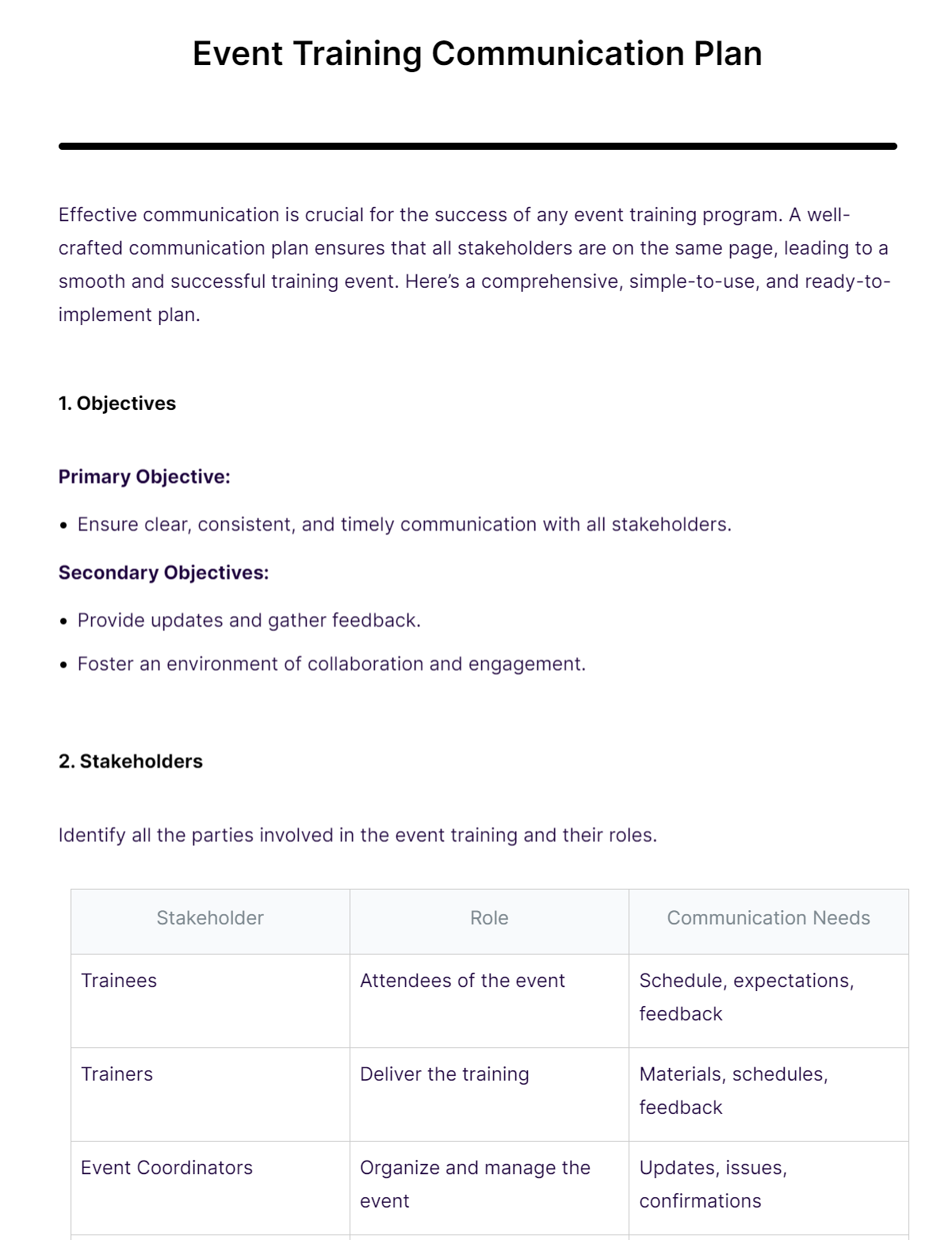
The Event Training Communication Plan provides a detailed guide for effective communication in event training programs. It emphasizes the importance of clear, consistent, and timely communication with stakeholders, outlining primary and secondary objectives, identifying stakeholders and their roles, and selecting appropriate communication channels. The plan includes a communication schedule, feedback mechanism, contingency communication strategies, key messages, visual aids, and evaluation methods to ensure a successful and impactful event.
Events Communications Plan Checklist
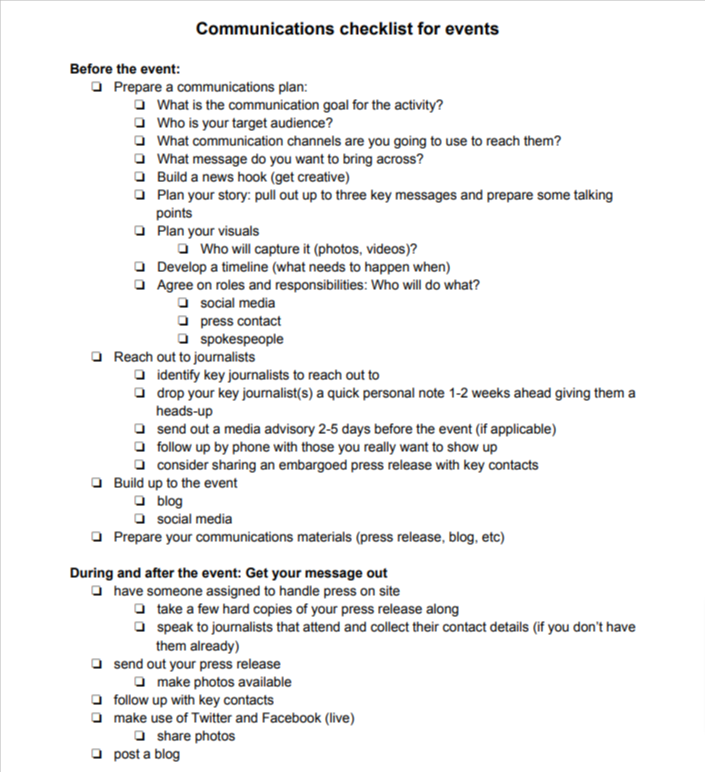
gofossilfree.org
Edit & Download For FreeCommunications Plan for Special Events
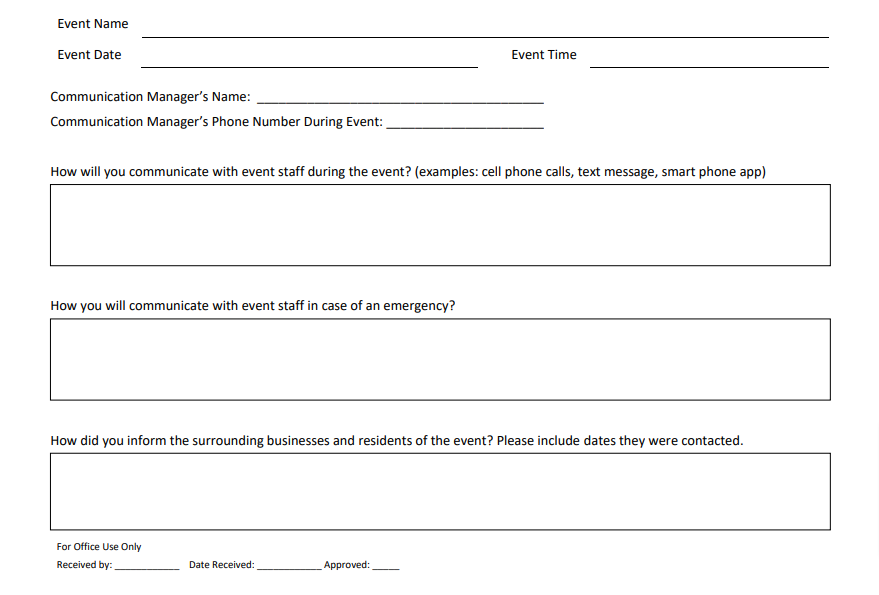
media.alexandriava.gov
Edit & Download For FreeGuide to a Perfect Event Communication Plan
Crafting a perfect Event Communication Plan is essential for orchestrating successful events. It involves strategic messaging, clear objectives, and tailored communication to engage and inform all participants effectively. This guide offers insights into creating a seamless communication flow, ensuring your event is a hit with every attendee.
- Event App Notifications: Send real-time updates about schedule changes or upcoming sessions directly to attendees’ phones.
Attention attendees! The keynote address will now commence at 11 AM in the main hall. Please make your way there to secure a good seat.
- Personalized Email Campaigns: Segment your audience and send tailored emails with information relevant to each group.
Dear [Name], we’ve noticed you’re interested in digital marketing. Don’t miss our workshop on SEO strategies this afternoon
- Interactive Social Media Posts: Create engaging content on platforms like Twitter and Instagram to update and interact with your audience.
What session are you most excited about today? Comment below and let’s get the conversation started! #EventHashtag
- Dedicated Event Hashtags: Encourage attendees to use a specific hashtag when posting about the event to streamline communication and build community.
Share your event experience using #OurGreatEvent and join the global conversation
- Feedback Surveys: Send out post-session or post-event surveys to gather valuable feedback and communicate appreciation for attendees’ input.
Tell us what you think! Your feedback on today’s sessions helps us create even better events in the future.
- Emergency Text Alerts: Quickly communicate any urgent information or changes due to unforeseen circumstances.
Please be advised, due to weather conditions, the outdoor networking event has been moved to the Grand Ballroom.
- Informational Booths: Set up booths at the event where attendees can get answers to their questions and additional information.
Got questions? Our friendly staff at the Info Booth are here to help you navigate the event seamlessly!
- Video Teasers: Release short, engaging videos before the event to build excitement and provide essential information.
Check out what’s in store for you at this year’s mega event! Click to watch our latest teaser video.
- Live Q&A Sessions: Organize sessions where attendees can ask questions in real-time, fostering a two-way communication channel.
Join our live Q&A at 2 PM. Drop in your questions and get instant responses from our expert panel!
- Digital Brochures: Provide detailed event information in an easily accessible digital format that attendees can refer to anytime.
Explore our digital brochure to plan your day and ensure you don’t miss any of the action at #OurGreatEvent.
Strategies for Corporate Event Communication Plan
Crafting a corporate event communication plan involves strategic thinking and detailed execution. It’s about conveying the right message, to the right people, at the right time. Effective communication strategies can significantly enhance participant engagement, streamline operations, and ensure the event’s success.
1. Define Clear Objectives: Start by outlining what the event aims to achieve and how communication will support these goals.
Our objective is to foster networking opportunities and share industry insights effectively.
2. Segment Your Audience: Identify different groups within your audience and tailor messages to suit their specific interests and needs.
For our managerial attendees, we’ll focus on leadership development opportunities.
3. Choose Appropriate Channels: Select the most effective channels for your audience, whether it’s email, social media, or internal platforms.
We will disseminate the latest updates via our dedicated event app.
4. Create a Content Calendar: Plan and schedule your communication to ensure consistent and timely delivery of your messages.
Our next announcement will focus on keynote speakers, scheduled for next Monday.
5. Personalize Communications: Tailor messages to make them more relevant and engaging to each recipient or group.
Dear [Name], we’ve designed workshops specifically for your interests.
6. Utilize Visual Aids: Incorporate visuals like infographics or videos to make your communication more engaging.
Check out this infographic for a quick overview of the event schedule.
7. Implement Feedback Loops: Encourage and facilitate feedback before, during, and after the event to continuously improve.
We value your input. Please share your thoughts on today’s sessions.
8. Train Your Team: Ensure everyone involved understands the communication plan and their specific roles.
Let’s review the communication protocol during our next team meeting.
9. Monitor Engagement: Keep track of how your audience interacts with your communications and adjust strategies as needed.
Our recent email had a high open rate, let’s use a similar subject line next time.
How to Prepare a Flawless Event Communication Plan?
Creating a flawless Event Communication Plan is vital for the success of any event. It involves strategic planning and implementation to ensure that every message resonates with the intended audience and achieves the desired impact. Here’s a step-by-step guide to prepare an effective Event Communication Plan:
- Define Your Communication Objectives: Start by setting clear goals. What do you want to achieve with your communication? This could range from raising awareness about the event to driving ticket sales or engaging attendees during the event.
- Understand Your Audience: Tailor your communication plan to your audience. Identify their preferences, demographics, and the best channels to reach them. This will help in creating relevant and engaging content.
- Develop Key Messages: Craft compelling messages that align with your event’s theme and objectives. These should be clear, concise, and consistent across all communication channels.
- Choose the Right Communication Channels: Select channels that best reach your target audience. This might include social media, email newsletters, press releases, and event apps. Each channel should have a specific role in your communication strategy.
- Create a Content Calendar: Plan and schedule your communication activities. A content calendar helps in organizing when and where to publish your content. This includes pre-event announcements, real-time updates during the event, and post-event follow-ups.
- Assign Roles and Responsibilities: Clearly define who is responsible for each aspect of the communication plan. This ensures that all team members know their responsibilities and can work efficiently towards common goals.
- Prepare for Crisis Management: Develop a crisis communication plan to handle any unforeseen circumstances. This should include protocols for quick response, key messages for different scenarios, and a designated crisis communication team.
- Monitor and Adapt: Throughout the event, monitor the effectiveness of your communication efforts. Be ready to adapt your strategy based on audience feedback and engagement metrics.
- Evaluate and Learn: After the event, evaluate the success of your communication plan. Gather feedback from attendees, sponsors, and team members to learn what worked well and what can be improved for future events.
How to Create an Engaging Event Communication Plan?
Creating an engaging Event Communication Plan is crucial for the success and smooth operation of any event. It ensures all participants are well-informed, involved, and motivated throughout the event. Here’s a step-by-step guide to crafting a plan that captivates and communicates effectively.
Understand Your Audience: Begin by identifying and understanding your audience. Are they professionals, students, or a mix? What are their interests and communication preferences? Tailoring your plan to the audience ensures relevance and engagement.
Define Clear Objectives: What do you wish to achieve with your communication? Is it to inform, encourage participation, or perhaps gather feedback? Setting clear objectives guides your strategy and helps measure success.
Select the Right Channels: Choose communication channels that best reach your audience. This might include emails, social media, mobile apps, or even physical banners and signage at the event. Consider the effectiveness and accessibility of each.
Craft Compelling Content: Your messages should be clear, concise, and compelling. Use a tone that resonates with your audience and keep the content relevant to their interests and needs. Incorporate visuals where possible to enhance engagement.
Timing is Key: Schedule your communications strategically. Initial announcements, regular updates leading up to the event, and real-time information during the event are crucial. Post-event communication is also essential for feedback and maintaining engagement.
Train Your Team: Ensure every team member understands their role in the communication plan. Clear guidelines on who communicates what, when, and through which channel can prevent confusion and ensure a cohesive approach.
Monitor and Adapt: Keep an eye on the effectiveness of your communications. Are people responding and engaging? Be prepared to adapt your strategy if certain aspects aren’t working as well as expected.
Gather Feedback: Post-event, gather feedback on the communication effectiveness. What did the audience like, and what could be improved? This will be invaluable for future events.
Review and Reflect: Finally, review the entire communication process. Reflect on what worked well and what didn’t. This reflection will help refine your Event Communication Plan for future projects, ensuring continuous improvement and success.
When planning communication for event promotion, it’s crucial to apply a strategic approach that changes behavior and encourages action. Identify clear goals, define your target audience carefully, develop compelling key messages, and consider user scenarios for optimal engagement. This strategy ensures your message is tailored and impactful, prompting your desired audience to act, whether attending your event or participating actively.
Effective event communication is pivotal for the success of any event. It eases the planning stress and maintains a continuous relationship with attendees, ensuring current and future success. The process involves clear pre-event information to relax and prepare attendees, dynamic engagement during the event, and thoughtful post-event follow-ups. By focusing on the attendee’s experience and enabling two-way communication, organizers can create a more immersive and satisfying event experience.



